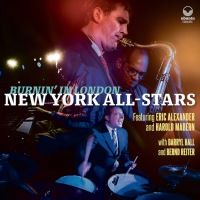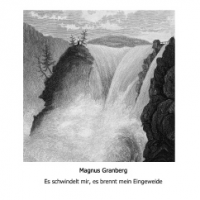Home » Jazz Articles » Extended Analysis » Alan Skidmore: Naima/Live in Berlin
Alan Skidmore: Naima/Live in Berlin
Along the way there have been some fine albums in his own name from the debut Once Upon a Time(1969 Deram), through TCB (1970 Phillips), El Skid with Elton Dean (1977 Vinyl), After The Rain (1998 Miles Music) and three great records using South African percussion group, Amampondo—The Call (1999 Provocateur), Ubizo (2003 Provocateur) and 50 Journeys (2008 Provocateur). What a career!
This double CD with two very different groups finds him paying tribute to John Coltrane, along with Skidmore's dad Jimmy, his greatest influence or, better, inspiration. The first of the two record, Live in Berlin, features the young rhythm section that also recorded Impressions of Coltrane (2011 ITM) and with whom Skidmore worked through 2007. The word 'young' belies the maturity and self-confidence on display here.
Mike Gorman is an assured soloist and accompanist. Perhaps his best performance here is on "Resolution" from Love Supreme, very Tyneresque with some amazing cascades of notes part way through. His solo on "Impressions," taken at breathtaking speed runs it a close second. Bassist Aidan O'Donnell opens both numbers with a cadenza, in the case of the former all too brief though longer on "Impressions." Both left me wishing his bass had been given greater prominence in the mix. There's some interesting stuff going on in the ensembles but—being a bit mutton—I struggled to hear this. No such problems with drummer Ian Palmer, a musician with excellent time and plenty of ideas. And over it all, Skidmore leads from the front. This music was written a long time ago but, in his hands, it sounds like it was freshly minted yesterday.
If there is a difference between the two sets, it would be that Naima, with its cover photo of Skid's grand-daughter Naima, has a more relaxed, collegial feel. Skidmore, pianist Steve Melling, bassist Geoff Gascoyne and the late, great drummer Tony Levin know each other's playing intimately. Not that the playing is less intense—Melling is incandescent on "Giant Steps." But it's a quieter intensity, as evidenced by Melling's lovely playing behind the leader on the title track. The title track is something of a masterclass. Gascoyne's bass holds to the pace, caressing the ballad gently, while Levin creates subtle washes of percussion underneath. Tension is built by restraint. Much the same could be said about "After the Rain," justly one of Skidmore's favourite ballads. There are barnstorming versions of "Some Other Blues" and "Transition." However, for me, the standout track is "Ascension." It's hard number to pull off with authority in the way it shifts between rubato and a steadier pulse. Thankfully, Skidmore refuses to play safe. Its middle section is delivered by the leader with force majeure over suitably wild rhythms. Add to that Levin's drum solo with its echoes of Africa and you have a remarkable take on a very difficult piece, indeed.
Anyone familiar with Skidmore's work will want this record. For the unfamiliar, it sure ain't a bad place to start.
Alan Skidmore talked to author Duncan Heining about Naima.
All About Jazz: You saw John Coltrane on his only visit to the UK. What were your impressions (!) of what you heard and saw back then?
Alan Skidmore: Although I was fairly young at the time, about 18/19, I remember the concert so well. I think the venue was the Walthamstow Granada. My father took me to see the Dizzy Gillespie Group. Lo' and behold also on the bill was The John Coltrane Quintet. The group comprised of John Coltrane on soprano saxophone, Eric Dolphy on alto and then McCoy Tyner on piano, Reggie Workman on bass and Elvin Jones on drums.
Up until that time, I had been listening to Paul Gonsalves and Dexter Gordon trying to figure out how to play jazz, studying hard in my bedroom. So hearing John Coltrane's group at that time, playing "My Favourite Things" for an hour was something I had never experienced before. I left the theatre feeling that I had heard something special but not knowing what it was. But, as it happened, it was the beginning of a wonderful journey for me. For one reason or another Coltrane never came back to the UK in 1962/63 with the 'Classic Quartet,' when they toured Europe. Tragic for us all in this country.
AAJ: You knew and played with 'Trane's drummer Elvin Jones. What was he like to work with?
AS: I had worked with Elvin in the George Gruntz Concert Jazz Band' touring Europe, for several weeks, which was fantastic. Subsequently, I was delighted when I received the call from him asking me to work with his group The Elvin Jones Jazz Machine at Ronnie Scott's.
He was a joy to work with because of his time and feeling, which are legendary. It was a truly wonderful experience. By that time I had been listening to the John Coltrane Quartet and had decided that he was in my opinion the greatest drummer I had ever heard, and still is to this day. Not only that, he was one of the kindest, nicest, courteous, gracious people that I have ever known. One night during the period I worked with him at Ronnie Scott's Club, we finished the first set and I went downstairs and to get myself a beer. When I came back up to the dressing room, there were three drummers in the room—Elvin, Art Blakey and Max Roach. Elvin introduced me and I stood in the corner of the room and kept my trap shut just listening to these three legends talking. An awesome experience. Elvin did understand how I felt about John Coltrane's music and we spent many an hour talking. He told me many stories about being on the road with the Quartet and it was a privilege hearing it from 'the horse's mouth,' so to speak. One thing I can share with you is that he told me 'Trane was a lovely, kind, gentle person.
AAJ: Given that Elvin must be a hard act to follow, what do you look for in a drummer? On 'Naima' you have the great, late Tony Levin and on 'Live in Berlin' Ian Palmer. There's quite a contrast between them.
AS: I look for passion, feeling, rhythm and time combined with a driving force. In my view the job of the drummer is to kick the soloist 'up the arse.' The kind of music I play, demands intensity, spirit and energy, witnessed if you listen to John Coltrane and Elvin Jones. Tony and Ian in their own way, provided all these qualities.
AAJ: How did the two different sections affect your own approach to the music?
AS: The two rhythm sections didn't really affect my approach to the music. It was more the case that they were hand-picked by me to do the job they did so eloquently.
AAJ: You remain justly a committed fan of Coltrane and his legacy. What is it for you that makes his music so very important in the history of jazz?
AS: I have been a devotee of John Coltrane for more than 50 years for many reasons, not least of all his sound, feeling and technique. In my opinion he changed the course of jazz history with his composition 'Giant Steps.' I grew up in a household listening to the music of Lester Young, Coleman Hawkins et al. Then I heard John Coltrane playing 'Chasin' The Trane' and it changed my life forever. What I heard was something quite remarkable—after all it's just a blues in F major! There are so many positives to say about John Coltrane—his wonderful compositions and playing on such recordings as Blue Trane, Crescent, A Love Supreme,' leading up to the phenomenal Sunship and Transition. And these are just a few of his many magnificent albums. Simply, John Coltrane was just the greatest tenor saxophonist I have ever heard in my life. I will be forever thankful for his existence and the sheer joy his music has given me in my life. It all began in Walthamstow in 1961 and is ongoing.
Track Listing
Naima: Giant Steps; Naima; Some Other Blues; After the Rain; Transition; Ascension. (recorded UK 2011) Live in Berlin: But Not For Me; Say It; Resolution; Impressions; Take the Coltrane. (recorded Berlin 2007)
Personnel
Alan Skidmore
saxophoneNaima: Alan Skidmore: tenor saxophone; Steve Melling: piano; Geoff Gascoyne: bass; Tony Levin: drums. Live in Berlin: Alan Skidmore: tenor saxophone; Mike Gorman: piano; Aidan O’Donnell: drums; Ian Palmer: drums.
Album information
Title: Naima/Live in Berlin | Year Released: 2018 | Record Label: Jazzwerkstatt
Tags
PREVIOUS / NEXT
Support All About Jazz
 All About Jazz has been a pillar of jazz since 1995, championing it as an art form and, more importantly, supporting the musicians who make it. Our enduring commitment has made "AAJ" one of the most culturally important websites of its kind, read by hundreds of thousands of fans, musicians and industry figures every month.
All About Jazz has been a pillar of jazz since 1995, championing it as an art form and, more importantly, supporting the musicians who make it. Our enduring commitment has made "AAJ" one of the most culturally important websites of its kind, read by hundreds of thousands of fans, musicians and industry figures every month.





















